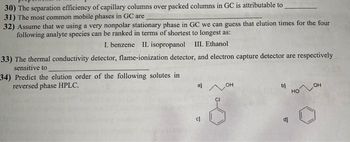
Chemistry
10th Edition
ISBN: 9781305957404
Author: Steven S. Zumdahl, Susan A. Zumdahl, Donald J. DeCoste
Publisher: Cengage Learning
expand_more
expand_more
format_list_bulleted
Question

Transcribed Image Text:30) The separation efficiency of capillary columns over packed columns in GC is attributable to
31) The most common mobile phases in GC are
32) Assume that we using a very nonpolar stationary phase in GC we can guess that clution times for the four
following analyte species can be ranked in terms of shortest to longest as:
I. benzene II. isopropanol III. Ethanol
33) The thermal conductivity detector, flame-ionization detector, and electron capture detector are respectively
sensitive to
34) Predict the elution order of the following solutes in
reversed phase HPLC.
OH
OH
CI
Expert Solution
This question has been solved!
Explore an expertly crafted, step-by-step solution for a thorough understanding of key concepts.
This is a popular solution
Trending nowThis is a popular solution!
Step by stepSolved in 2 steps

Knowledge Booster
Learn more about
Need a deep-dive on the concept behind this application? Look no further. Learn more about this topic, chemistry and related others by exploring similar questions and additional content below.Similar questions
- Which of the following compounds will elute LAST in a reverse phase chromatography? а. b. Br с. NH2 d.arrow_forwardTwo commonly used chromatography methods in labs are Nickel and streptavidin resin based colums. Explain which type of chromatography-ion exchange, size-exclusion, or affinity-these are, as well as their seperation mechanisms at a molecular level.arrow_forward2arrow_forward
- The best choice of mobile phase in a thin layer chromatography experiments is: Group of answer choices The most volatile solvent possible. The least polar solvent possible. The most polar solvent possible. A mixture of solvents that takes into consideration the polarity of the analyte.arrow_forwardPlease don't provide handwritten solution ......arrow_forwardI have a question with the answer but I don't really understand it. Can you please explain the logic in this question & answer? For example, the hormone estradiolhas a partition coefficient of 3.2 between 1-octanol and water. How many extractions would need to be completed to recover > 99% from 250 mL of saturated solution using 100 mL of 1-octanol per extraction? The variables given are listed below along with the solution. In this scenario, it would require 5 extractions to recover > 99% of estradiol! Typically extractions are carried out only 2 or 3 times because the partition coefficient is usually larger than 3.2 and there are equal amounts of organic solvent and the aqueous layer.arrow_forward
arrow_back_ios
arrow_forward_ios
Recommended textbooks for you
 ChemistryChemistryISBN:9781305957404Author:Steven S. Zumdahl, Susan A. Zumdahl, Donald J. DeCostePublisher:Cengage Learning
ChemistryChemistryISBN:9781305957404Author:Steven S. Zumdahl, Susan A. Zumdahl, Donald J. DeCostePublisher:Cengage Learning ChemistryChemistryISBN:9781259911156Author:Raymond Chang Dr., Jason Overby ProfessorPublisher:McGraw-Hill Education
ChemistryChemistryISBN:9781259911156Author:Raymond Chang Dr., Jason Overby ProfessorPublisher:McGraw-Hill Education Principles of Instrumental AnalysisChemistryISBN:9781305577213Author:Douglas A. Skoog, F. James Holler, Stanley R. CrouchPublisher:Cengage Learning
Principles of Instrumental AnalysisChemistryISBN:9781305577213Author:Douglas A. Skoog, F. James Holler, Stanley R. CrouchPublisher:Cengage Learning Organic ChemistryChemistryISBN:9780078021558Author:Janice Gorzynski Smith Dr.Publisher:McGraw-Hill Education
Organic ChemistryChemistryISBN:9780078021558Author:Janice Gorzynski Smith Dr.Publisher:McGraw-Hill Education Chemistry: Principles and ReactionsChemistryISBN:9781305079373Author:William L. Masterton, Cecile N. HurleyPublisher:Cengage Learning
Chemistry: Principles and ReactionsChemistryISBN:9781305079373Author:William L. Masterton, Cecile N. HurleyPublisher:Cengage Learning Elementary Principles of Chemical Processes, Bind...ChemistryISBN:9781118431221Author:Richard M. Felder, Ronald W. Rousseau, Lisa G. BullardPublisher:WILEY
Elementary Principles of Chemical Processes, Bind...ChemistryISBN:9781118431221Author:Richard M. Felder, Ronald W. Rousseau, Lisa G. BullardPublisher:WILEY

Chemistry
Chemistry
ISBN:9781305957404
Author:Steven S. Zumdahl, Susan A. Zumdahl, Donald J. DeCoste
Publisher:Cengage Learning

Chemistry
Chemistry
ISBN:9781259911156
Author:Raymond Chang Dr., Jason Overby Professor
Publisher:McGraw-Hill Education

Principles of Instrumental Analysis
Chemistry
ISBN:9781305577213
Author:Douglas A. Skoog, F. James Holler, Stanley R. Crouch
Publisher:Cengage Learning

Organic Chemistry
Chemistry
ISBN:9780078021558
Author:Janice Gorzynski Smith Dr.
Publisher:McGraw-Hill Education

Chemistry: Principles and Reactions
Chemistry
ISBN:9781305079373
Author:William L. Masterton, Cecile N. Hurley
Publisher:Cengage Learning

Elementary Principles of Chemical Processes, Bind...
Chemistry
ISBN:9781118431221
Author:Richard M. Felder, Ronald W. Rousseau, Lisa G. Bullard
Publisher:WILEY